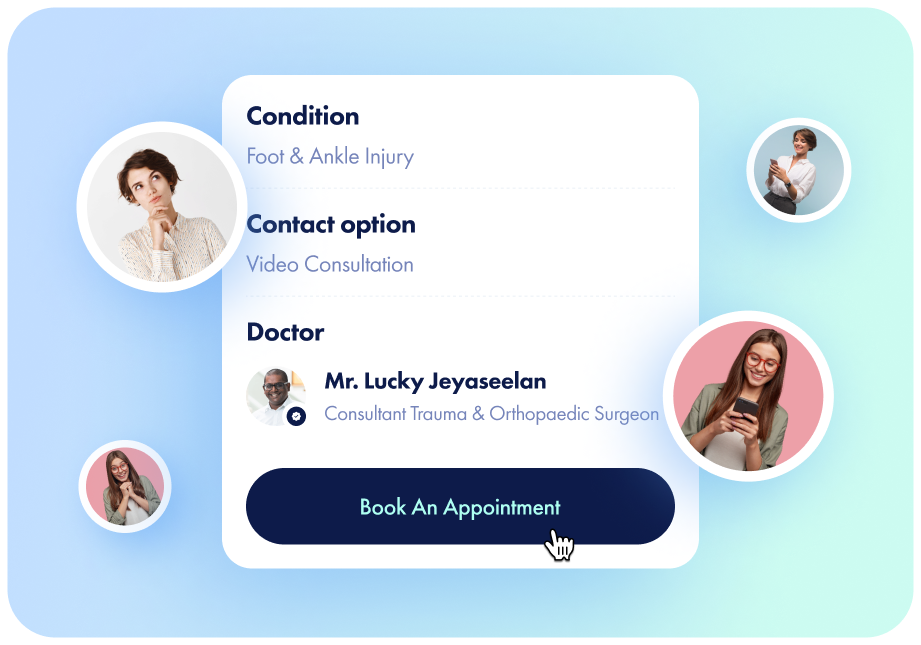
Conveniently reserve your spot with just a few clicks through our easy-to-use online booking system.

Carpal tunnel syndrome is a common condition that causes pain and discomfort in the hand and wrist. It occurs when the median nerve, responsible for feeling and movement in the thumb and fingers, is compressed within the carpal tunnel, a narrow passage in your wrist. This compression can lead to numbness, tingling, weakness, and even pain radiating up your arm. Fortunately, carpal tunnel syndrome is treatable with various methods, allowing you to regain use and function in your hand.
You are not required to provide a referral letter from your doctor or GP.
Start a visit quickly and discreetly whenever works best for you.
Our doctors review symptoms, prescribe treatments if needed.
Proceed with your healthcare journey as you wish. You're in control.
You control medical records, access anytime.
When diagnosing carpal tunnel syndrome, your healthcare provider will consider your experiences and conduct specific tests. They'll review how your symptoms present. Common triggers like holding a phone or waking up with symptoms are telltale signs.
A physical examination will test sensitivity and muscle strength in your hand. Simple actions like bending your wrist or tapping the nerve can often bring on symptoms.
An X-ray may be used to rule out other causes of wrist pain. For a detailed look at nerve compression, an ultrasound might be recommended. Neurophysiology tests are used to diagnose carpal tunnel. This inlcudes eElectromyography, which measures muscle electrical activity, identifying potential nerve damage, while a nerve conduction study checks for electrical impulse delays in the carpal tunnel. These comprehensive tests ensure a thorough and accurate diagnosis.
Сontact us to schedule an appointment or learn more
Conveniently reserve your spot with just a few clicks through our easy-to-use online booking system.
Have a question or request? Drop us a message, and our team will get back to you promptly.
Feel free to give us a call, and our friendly staff will be glad to assist you over the phone.
Treating carpal tunnel syndrome early is crucial. Self-care measures like taking breaks, avoiding aggravating activities, and applying cold packs might suffice. But if your symptoms persist or worsen, other treatment methods include:
Wearing a splint at night keeps your wrist still, alleviating nocturnal symptoms and potentially preventing daytime discomfort.
Drugs like ibuprofen can offer short-term pain relief, though they don't necessarily treat the syndrome itself.
Injections into the carpal tunnel can reduce inflammation and relieve median nerve pressure. Oral corticosteroids are less effective.
In cases where carpal tunnel syndrome is linked to conditions such as rheumatoid arthritis, treating the underlying issue may help.
If your symptoms are severe or don't respond to conservative treatments, you might need surgery. The goal is to relieve pressure on the median nerve by cutting the ligament pressing on it. Techniques include:
A less invasive option using a camera-equipped device or ultrasound to guide a ligament-cutting tool.
Involves a direct incision in the palm to access and cut the ligament.
Full recovery, including internal healing of ligament tissues, can take several months. In cases with severe symptoms, achieving complete resolution of symptoms may not be possible even after surgery.
From Home or Face to Face, all at your convenience
Schedule a Video Consultation or a Face-to-Face appointment at your convenience by using our online booking system.
Speak with a Specialist
Schedule a Video Consultation or a Face-to-Face appointment at your convenience by using our online booking system.
Get a Personalised Treatment Plan
Your dedicated Specialist Doctor will provide you with personalized treatment, tailoring it to your specific needs, and may include necessary medication.
Living with carpal tunnel syndrome involves adopting strategies to minimise stress on your hands and wrists:
Use a relaxed grip and avoid exerting excessive force during activities like typing or writing. Choose ergonomic tools that are comfortable to use.
Take brief, frequent breaks to stretch and flex your hands and wrists. This can alleviate the strain.
Maintain a neutral wrist position and ensure your workspace, like your keyboard, is set up ergonomically. Correct your overall posture to avoid compressing nerves that can exacerbate symptoms.
Keep your hands warm, particularly if you work in a cooler environment. Cold can increase discomfort and stiffness.
Don't ignore persistent symptoms. Early intervention can prevent permanent damage, such as muscle atrophy or severe nerve compression.
Implementing these simple yet effective changes can improve your daily comfort and prevent the progression of carpal tunnel syndrome.
Living with carpal tunnel syndrome involves adopting strategies to minimise stress on your hands and wrists:
Use a relaxed grip and avoid exerting excessive force during activities like typing or writing. Choose ergonomic tools that are comfortable to use.
Take brief, frequent breaks to stretch and flex your hands and wrists. This can alleviate the strain.
Maintain a neutral wrist position and ensure your workspace, like your keyboard, is set up ergonomically. Correct your overall posture to avoid compressing nerves that can exacerbate symptoms.
Keep your hands warm, particularly if you work in a cooler environment. Cold can increase discomfort and stiffness.
Don't ignore persistent symptoms. Early intervention can prevent permanent damage, such as muscle atrophy or severe nerve compression.
Implementing these simple yet effective changes can improve your daily comfort and prevent the progression of carpal tunnel syndrome.
Living with carpal tunnel syndrome can be challenging, but remember, you're not alone. Our London-based clinic specialises in providing comprehensive care and advanced treatment options tailored to your needs.
Don't let discomfort dictate your life. Take the first step towards relief and reclaim your hand health. Book your appointment with us today.
















